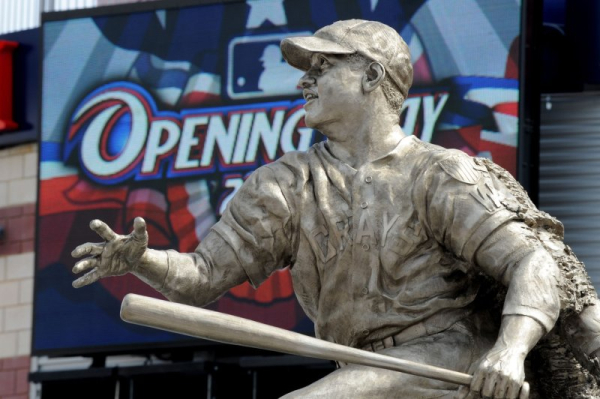Negro Leagues stat integration makes Josh Gibson new MLB batting leader

1 of 4 | A sculpture of Hall of Fame catcher Josh Gibson sits at Nationals Park in Washington, D.C. File Photo by Pat Benic/UPI | License Photo
MLB’s integration of Negro League statistics made Josh Gibson the new all-time leader in batting average, slugging percentage and OPS, the league said Wednesday.
The integration also led to improved career statistics for Willie Mayes, Satchel Paige and Jackie Robinson, among other baseball icons. Advertisement
The league officially designated play in the Negro Leagues — from 1920 to 1948 — as “Major League” in 2020. MLB said more data is “still being discovered.”
“We are proud that the official historical record now includes the players of the Negro Leagues,” MLB commissioner Rob Manfred said in a news release.
“This initiative is focused on ensuring that future generations of fans have access to the statistics and milestones of all those who made the Negro Leagues possible.
“Their accomplishments on the field will be a gateway to broader learning about this triumph in American history and the path that led to Jackie Robinson’s 1947 Dodger debut.” Advertisement
Gibson is listed with a .372 batting average in MLB’s official database, better than the former top mark (.367) owned by Ty Cobb. Fellow Negro Leagues star Oscar Charleston is listed with the third-best average (.363) in history.
Buck Leonard (.345), Turkey Stearnes (.348) and Jud Wilson (.350) are now the other former Negro Leagues stars in the Top 10 for career batting average.
Gibson’s .718 slugging percentage now leads Ruth (.690), Williams (.634) and Gehrig (.632). Negro League legends Mule Suttles (.621), Stearnes (.616), Charleston (.613) round out the Top 7 in that category.
Gibson’s .459 on-base percentage trails only Williams and Ruth. Leonard (.452), Charleston (.448) and Wilson (.434) also rank inside the Top 10.
Gibson’s 1.177 OPS — on-base plus slugger percentage — edges Ruth (1.164), Williams (1.116), Gehrig (1.079) and Charleston (1.061) for the new all-time mark. MLB career home run (762) leader Barry Bonds (1.051) ranks sixth in that category.
Gibson’s Hall of Fame plaque reads that he hit “almost 800 home runs in league and independent baseball,” but he is only credited with 174 in MLB’s database because researchers haven’t found box scores to support comprehensive totals. Advertisement
Several single-season records also are now attributed to Gibson. His .466 mark from the 1943 campaign with the Homestead Grays is now the best in history. Charlie “Chino” Smith, who hit .451 in 1929 for the Negro Leagues’ New York Lincoln Giants now owns the second-best mark.
Paige is now listed with a 1.01 ERA for his 1944 campaign with the Kansas City Monarchs, the third-best mark in history for a single season, behind Tim Keef and Dutch Leonard.
Dave Brown, who pitched in the Negro Leagues from 1920 to 1925, now owns the eighth-best career ERA (2.24) — and best ever for a Negro Leagues pitcher.
The integration resulted in Micky Minoso’s 150 hits with the New York Cubans being added to his total, which now eclipses 2,000 (2,113).
Robinson’s 49 hits from the 1945 season with the Monarch’s moved his total to 1,567, which ranks No. 587. Mays’ 10 hits from the 1948 season with the Birmingham Black Barons increased his total from 3,283 to 3,293. He kept his spot with the 12th-most hits in baseball history.
Paige’s win total was increased from 125 from 28, which is tied for No. 402 in history. Advertisement
MLB estimates that statistics from the Negro Leagues from 1920 to 1948 are nearly 75% complete. Bill Greason (99), Mays (93) and Ron Teasley (97) are the only living former Negro Leagues players. The changes to baseball records followed an evaluation by the Negro Leagues statistical review committee.
MLB leaned on decades-long work of many researchers to accumulate the statistics, as many game accounts are lost, distorted or were never recorded.
“Stories, folklore and embellished truths have long been a staple of the Negro Leagues narrative,” baseball historian Larry Lester said. “Those storylines will always be entertaining, but now our dialogues can be quantified and qualified to support the authentic greatest of these athletes.
“Every fan should welcome this statistical restitution toward social reparation.”